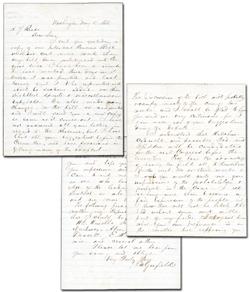
Garfield, James A. (1831-1881) 20th President of the United States, 1881.
Autographed Letter Signed as Congressman. Three full pages, Quarto, on green-ruled bond with a Congressional blind stamp, Washington, May 5, 1866. Fascinating letter to H.Y. Beebe, a trusted confidante and political ally of the young Congressman, concerning a massive Internal Revenue Bill before Congress and the young Congressman's prospects for re-election. Garfield writes:
"Dear Sir, I sent you yesterday a copy of our Internal Revenue Bill which has cost more work than any bill ever introduced into Congress since I have been a member. We have worked three days on it since it was printed and last evening sent it to be reprinted with about sixty sections added - on Beer Distilled Spirits & miscellaneous subjects. We also made many changes in the bill as now printed and I will send you a new copy as soon as it comes out. I have not answered all your letters in regard to the Revenue, but I have laid all your suggestions before the Committee, and have succeeded in getting many of them adopted. The discussion of the bill will probably occupy much of the coming two weeks, and I shall be glad to have you send me any criticisms - for I can make use of your suggestions during the debate."
Garfield then changes tack, and begins a frank discussion of his upcoming campaign for re-election to Congress:
"I understand that Hutchins, Caldwell, and possibly Tod and Glidden will be candidates for the next Congress before the convention. They have the advantage of having the field all to themselves for the next two or three weeks & I wish you would write me your impressions of the probabilities and prospects in the case. I ask nothing more than to secure a fair Expression of the people, but I know that will not be likely to be had without some work on the part of my friends. I do not know what your own preference is in the matter - but supposing you would be willing to assist me I have taken the liberty to write you - and hope you will tell me your impressions - and do what you can to aid me. I know of no one who has so full a knowledge of the leading men of the District - or who would be able [to] aid me more than you.
The following persons have voluntarily written me - expressing their desire that I should be returned - W.C. Howells, Judge Chaffe, S.A. Northway, ...and several others. Please let me hear from you seen, and oblige Very Truly Yours - JA Garfield."
Garfield demonstrates a remarkable frankness about his belief in the practical necessity of using his allies for political support - a pragmatism which was to serve him well and secure him a lengthy tenure in Congress. Garfield had first been elected to Congress in 1863 and was returned every election including that of 1880, when he was also elected to the Presidency. Equally fascinating is the fact that Congress should be so absorbed with an Internal Revenue Bill this early in the process of instituting the policies of Reconstruction. In an effort to get the states out of the business of issuing their own currency, Congress was attempting to impose a tax on all State bank notes, a measure which took effect later that year on July 1, 1866. This move dried up state money and was responsible for bringing about a stabilizing national currency.
Estimated Value $1,500-2,000.
